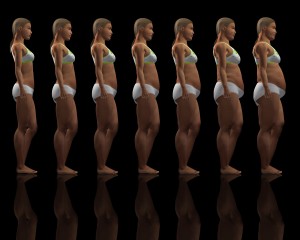
Kirsty Pargeter / Dollar Photo Club
Obesity and weight loss are complicated issues. It’s no longer about calories in versus calories out.
In a prior article I wrote about the contributions of environmental chemicals to obesity and diabetes. And this contribution is not a small one. You can read more about this relationship by clicking here.
Certainly the quality of the foods you eat, the calories and the amount of calories that you burn play a role. You can’t sit on the couch and eat 4,000 calories a day and not expect to gain weight. But what about the other extreme? What if you watch your calories, watch the quality of your calories as well as exercise consistently using both aerobic and resistance training and still cannot get to your ideal weight?
That is the frustrating situation you may find yourself in, ultimately throwing up your hands and giving up. And unfortunately, I can’t provide you with a direct, immediate answer. The answer to maintaining an ideal weight is not an easy one. It certainly requires attention to diet and exercise.
The harder factors to account for and change are the environmental ones I mentioned earlier. I know that in our household we have moved to stainless steel pitchers for our tea, glass and stainless steel for our water bottles, glass for our cups, natural / fragrance free dish soaps, laundry soaps and cleaners as well as getting any other chemicals that we can identify out of our lives. Not an easy task and we have to make some sacrifices as a family.
Talk about confusing. I cannot tell you how many patients are unaware that drinking out of plastic water bottles can make them fat. But what if the story got even MORE confusing?
Just what you wanted to hear. But that’s exactly what this particular study does. There has already been some hints from medical research that the bacteria in your gut can play a role in body fat. Stress, artificial sweeteners and antibiotics have all been shown to disrupt the delicate balance of the bacteria in your gut towards obesity and diabetes.
The researchers in this study took it quite a bit further. They took the bacteria in the gut of mice fed a high fat diet and transplanted this bacteria into mice who had basically had their guts wiped clean of bacteria so it was a clean slate. Here’s what happened to the mice given the high fat diet bacteria:
- There were disruptions in exploratory, cognitive, and stereotypical behavior (there were actual behavioral changes in the mice).
- There were disruptions in markers of intestinal barrier function (aka leaky gut).
- The was increased circulating endotoxin (more toxins from the bacteria in the gut).
- There was increased lymphocyte expression of ionized calcium-binding adapter molecule 1, toll-like receptor 2, and toll-like receptor 4 (basically, the white blood cells were gearing up for a fight with something).
- There was increased inflammation in the brain as well as alterations in the blood flow within the brain.
All of these changes from something as simple as changing the bacteria in the gut. Some would say this is just a mouse study and has no relevance. That argument is a little weak when you look at the human studies previously mentioned that have found relationships between bacteria in the gut and obesity. Then when you consider the reports of weight gain in patients who has undergone fecal transplants for C. diff infections this study becomes even more important.
The take home message is that the bacteria in your gut plays a strong role in your weight. The stress you experience, the foods you eat, your exercise and the drugs you take in (from anti-inflammatories and steroids down to antibiotics) all have an influence on your gut bacterial populations. Think on that when you decide to adopt a behavior that is known to negatively affect the bacteria in the gut.
